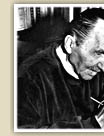|
|
 |
 |
 |
 |
 |
 |
 |
 |
 |
 |
|
Angelos Sikelianos
Sikelianos was deeply influenced by the poetic teachings of the
school of the Ionian Islands (from whence he came), and,
|

combining a secure sense of popular language, familiarity with foreign literatures
(especially Italian), he produced a template for a
Greek interpretation of modern Greek literature.
His first important poetic creation was Alafroiskiotos (Moonstruck), 1907, a poem overflowing with lyricism and identification
with nature.
The quest for wholeness, the motive of his creation, led
him to explore mystery cults, and above all Orphism, and to visit ancient Greek religious
centres (Olympia, Delphi, Eleusis); in turn, this exploration led to the vision of a universal myth
that combines a primordial matriarchal cult with the ancient Greek spirit,
along with Orphic teachings and the symbols of Christianity.
The erotic element is diffuse in his work, integrated in to his overall concept
of the world. All these influences are permeated with an impressive egocentricity and the concept
of the high mission of the poet-prophet. His work Prologos sti zoi (Prologue to Life), 1917, is considered his most
important, in which his whole poetic outlook is epitomized.
Sikelianos continued to write in the following period, which includes some of his best work, such as the well known 'Delphic venture'.
|
 |

Nikos Kazantzakis
Kazantzakis is a case all on his own, and as such is difficult to classify in the history of Greek
literature. Of the same age as
Angelos Sikelianos and Kostas Varnalis, he came to prominence at the beginning
of the twentieth century, when he produced work of exceptional breadth and volume, which he continued to do until his death in 1957. The philosophy of Nietzsche, the concepts of Bergson and his
theory about vital elan played a considerable role in the shaping of his poetics. He was constantly preoccupied with metaphysical (or existentialist) anxiety. From the 'elitist nationalism'
of the type of Ion Dragoumis, he passed to revolutionary and communist
ideas, as a result of his stay in Germany (1922-23), but ended up in believing in total,
'heroic nihilism'.
He considered the Odyssey, a poem of 33,333 lines in which his whole world view was expressed, to be his 'opus major'. He also wrote many plays
(tragedies), a genre that he believed gave him the chance to express himself.
Over the last years of his life he turned to the novel, with Vios kai Politeia tou
Alexi Zorba (The Life and Deeds of Alexis Zorbas), 1946, Ï Kapetan Michalis (Captain Michalis), 1953, Anafora ston Greko (Report to Greco), 1961, hoping to communicate to a wider public.
|
 |

Kostas Varnalis
At the beginning of the century another great poet, Kostas Varnalis, made his
appearance. He began with symbolic poems, such as Kyrithres, (Honeycombs), 1905, whereas in the following period
his work revealed intensely dionysian and musical elements but also satire. During his stay
in Paris, in the ideological atmosphere of the end of the First World War, he was drawn to dialectic
materialism and Marxism. In his works To Fos pou kaiei (The Burning Light), 1922, and Sklavoi
Poliorkimenoi (The Besieged Slaves), 1927, his new orientations show clearly in his dismantling of established values. Similar intentions are implemented in his much later prose Alithini Apologia tou Sokrati
(The True Defence of Socrates), 1931, and To Imerologio tis Pinelopis (The Diary of Penelope), 1946.
His contibution to criticism was considerable. Until the end of his life
he continued to intervene in social and political affairs and put his poetry,
with its social content dealing with the underprivileged social classs and the condemnation of
inequality, at the service of his political engagement.
|
 |
 |
|
